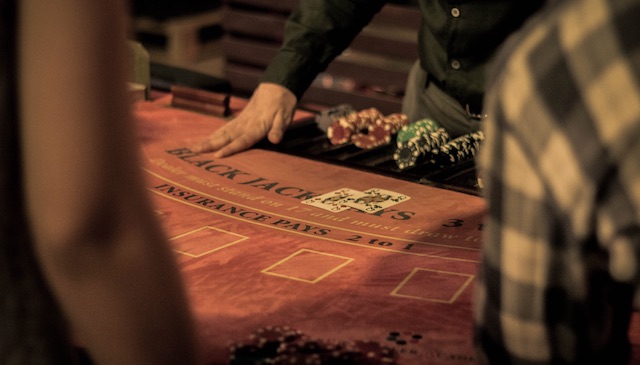Also Interesting
How Online Casinos Are Able To Create Community

If computer gaming can be social, so can online gambling. The social aspect of gaming now also translates to online gambling, as the two have many similarities. Online casinos are not preferred to land-based casinos for convenience but because they can be a way to socialize with others. With these new dynamics, creating a community at these online casinos is possible.
The History of The Social Aspect
Historically, gambling has also acted as a social activity. As a pastime activity, people have taken casinos in a more social context. People have sat in groups, playing poker and blackjack together, drinking coffee or alcohol together. It wouldn’t be appropriate not to mention how gambling has also been a concern of people whose family members or friends have suffered social costs because of their gambling addiction. But for those who are able to avoid addiction, the gambling practice can become a way to interact with other people.
Online gambling has become a space that takes on different areas like technology and discourses. Therefore, new online casinos are taking on the role of the facilitator for discussion, like the casinos at bonus.ca, where people can also find free spins and bonuses along the way. These casinos, therefore, make sure to incorporate social elements in the games.
Online Casino Chats
Those who cannot access brick-and-mortar casinos for geographical reasons cannot play poker and have the social aspect simultaneously. But with online casinos, this is no longer a concern. Today, many games include chats where people can exchange tips and comments and share conversations in general.
Because many online casinos host tournaments, the atmosphere can often get heated, and this is where the chats will overflow with comments. The discussions follow specific guidelines so people can participate without being judged or harassed by other players. Many of these players also return to the same online casinos because of loyalty programs, where they are rewarded with bonuses for their loyalty. This can also create a sense of community.
Forums And Discussions
Outside the online casinos, some forums and discussions encourage gamblers to engage in conversations about everything gambling or betting-related. Whether it is poker, slot machines or roulette, there is undoubtedly a forum for that. Here, people discuss how to play keno, bingo promotions, or sports results for betting. This is also great for people who have specific gambling questions, as many forums are visited by gambling experts, who have the answers for nearly everything. The forums become a form of community, as it is often the same people who will visit the forums.
Social Gaming on Facebook
An example of how online gambling has spread to social media is the example of social gambling on Facebook. Facebook is well-known for being a platform for all sorts of games. But this time, Facebook offered users to participate in online gambling, as a gaming company operated a poker game back in 2014. Here, players in certain countries were able to gamble with real money.
Furthermore, Facebook users could buy goods in games through the virtual currency called Facebook Credits. Since Facebook is a place of community, gambling becomes linked with a sense of community.
Creating Poker Clubs
A way to create community through online casinos is by creating gambling clubs. The idea of a poker club isn’t new, but there might not be many clubs for people who play online poker. All it takes is gathering our friends, an internet connection and a knowledge of the poker rules. Running a poker club this way doesn’t require a physical casino, as it can be hosted in the comfort of our own home.
Also Interesting
Losing as Strategy: How Pusoy Dos on GameZone Builds Tactical Skill

Winning has always been the shiny prize everyone chases—but any seasoned Pusoy Dos player knows that real mastery begins where the losing streak starts.
Behind every card drawn, every failed bluff, and every quiet defeat lies the blueprint of strategy itself.
In online Pusoy Dos, especially on GameZone, the concept of losing transforms from a simple setback into a calculated part of learning. It’s no longer just about who gets rid of their cards first; it’s about who can read the rhythm of the game, adapt quickly, and control the mental battlefield.
If you’ve ever thought losing was the opposite of winning, GameZone’s version of online Pusoy Dos might just convince you otherwise—it’s the training ground where every loss becomes a weapon.
The Strategic Framework of Losing
In traditional Pusoy Dos, luck and skill intertwine in every hand. Players learn to form melds, adjust their tempo, and predict opponents’ moves. But what truly defines success isn’t how often you win—it’s how well you respond to loss.
Every defeat forces recalibration. You learn to dissect what went wrong: Did you reveal your strong cards too early? Did you fail to anticipate a counter? Did your timing falter under pressure?
Losing gives you data, and data drives better decisions.
That’s why elite players on GameZone treat each loss like a post-match analysis session. It’s not about pride—it’s about pattern recognition. The sooner you embrace losing as a diagnostic tool, the faster your strategy evolves.
Tactical Patience: The Skill Behind the Calm
In online Pusoy Dos, patience isn’t passive—it’s tactical. When the game speeds up and pressure mounts, impulsive moves often spell disaster. The disciplined player, however, uses restraint as a strategic weapon.
GameZone’s competitive setup reinforces this mindset. The players who dominate over time are those who maintain composure, waiting for key openings rather than rushing to play their strongest hand.
This principle mirrors real-world strategic thinking: the concept of calculated delay. In war, business, or gaming, the most successful tacticians act when their timing aligns with maximum impact—not when emotions demand immediate action.
In this light, losing becomes less about failure and more about timing refinement. Each loss fine-tunes your sense of rhythm until you can read the invisible tempo of the table.
From Reaction to Anticipation: The Psychology of Strategic Loss
Every round of Pusoy Dos is an exercise in human psychology. Behind every card lies a decision driven by confidence, anxiety, or misdirection. Losing helps sharpen your ability to read these emotional undercurrents.
The more you lose, the more data you gather about how people behave under pressure.
You begin to see patterns: the players who panic after a few bad turns, the overconfident ones who burn their best cards too early, and the cautious types who never strike when they should.
By studying defeat, you build anticipation—a skill far more valuable than raw luck. On GameZone, this translates into superior adaptability.
You stop reacting to what happens and start predicting what’s about to happen. That’s where strategy stops being reactive and becomes proactive.
GameZone: The Strategic Laboratory
GameZone isn’t just another app; it’s a controlled environment where strategies evolve through iteration.
Unlike physical card games, where every loss is public and often accompanied by laughter or teasing, online play lets you fail in private and refine in peace.
The platform’s algorithm-based matchmaking system ensures you face opponents with varied styles, forcing constant adaptation.
You’re not memorizing tricks—you’re learning systems thinking.
Each round tests multiple dimensions of play:
- Risk management is about deciding when to hold or release key cards.
- Pattern detection is recognizing your opponents’ rhythms.
- Emotional control is about maintaining composure despite mediocre hands.
- Resource allocation is managing your cards like strategic assets.
In GameZone, losing repeatedly isn’t a setback; it’s accelerated training. The game essentially turns into a strategy simulator, where every misstep teaches long-term efficiency.
Control and the Illusion of Power
Many beginners assume that control in Pusoy Dos comes from having the best hand. But seasoned strategists know that control has little to do with cards and everything to do with mindset.
True control means mastering tempo—dictating the flow of the game rather than chasing it. Expert players create pressure for others, forcing opponents into reaction mode. Ironically, they achieve this by letting go of the illusion of total control.
You can’t dictate what cards you’re dealt, but you can control how those cards shape your overall narrative.
Losing a few rounds to study your opponent’s habits is a strategic sacrifice. It’s the same principle chess players use: sometimes you lose a pawn to win the board.
This mental flexibility—understanding when to let go and when to strike—is the foundation of strategic dominance.
The Strategic Edge of Emotional Discipline
In the high-paced ecosystem of online Pusoy Dos, emotions are your biggest liability. The difference between an average player and a master often lies in how they handle frustration.
Each loss on GameZone is a controlled stress test. It forces you to adapt without emotional interference, to make decisions grounded in logic rather than ego.
The result? Emotional neutrality—an essential component of strategic mastery.
Players who can detach emotionally from short-term outcomes gain long-term advantage. They build consistency, improve pattern recognition, and develop sharper instincts. And when they finally win, it’s not by accident—it’s by accumulated intelligence.
Why Strategic Players Outlast Lucky Ones
Luck is temporary; strategy compounds.
In Pusoy Dos, the luckiest players often burn out quickly. They rely on fortune instead of structure. Meanwhile, the strategic players—the ones who treat every game as a case study—steadily rise.
They plan multiple moves ahead, knowing when to hold back and when to challenge aggressively. Even when they lose, their learning curve sharpens. This steady growth mindset defines why they dominate tournaments and climb GameZone’s rankings.
Strategic play is an investment. Every hand, win or lose, contributes to a long-term framework of improvement. And like any investment, it’s patience and analysis—not emotion—that yield the highest returns.
Letting Go as Tactical Vision
Letting go isn’t surrender—it’s foresight.
When you stop obsessing over short-term results, your field of vision expands. You see the broader game: not just the cards in front of you, but the psychological terrain surrounding them.
Losing teaches you to recognize what matters most: positioning, momentum, and information control.
The moment you stop trying to micromanage every card and start focusing on long-term advantage, you evolve from player to tactician.
That’s what makes GameZone such a strategic training ground. It rewards those who think several moves ahead, those who understand that victory often hides behind patience and pattern recognition.
Strategic Takeaway: Every Loss Is a Data Point
The best Pusoy Dos players don’t fear losing—they use it. Every defeat becomes a record of timing errors, miscalculations, and emotional slips.
Over time, those records shape a player who’s not just good at cards but adept at strategy itself.
GameZone accelerates this process. Its consistent gameplay environment turns repetition into refinement. The more you play, the more you uncover the core principles of strategic behavior: balance, observation, and timing.
So, when you lose your next online Pusoy Dos match, don’t see it as wasted time. See it as field research. Every card played, every defeat endured, and every small adjustment made inches you closer to tactical excellence.
Because in both life and gaming, the best strategy isn’t just to win—it’s to learn how to lose effectively, efficiently, and intelligently.
Also Interesting
Alberta Puts Player Safety First in Upcoming iGaming Launch

Alberta is preparing to introduce a regulated online gambling market next spring, positioning standards and user choice at the heart of its approach. Provincial officials say the aim is straightforward: set consistent rules for an activity that already exists, give participants reliable information, and provide operators with a clear framework to follow. The Alberta iGaming Act, passed in May, established the foundation for this shift. Work now focuses on detailed regulations and the launch of the Alberta iGaming Corporation, which will conduct and manage online gaming and oversee licensing and compliance.
In early October, representatives attended the Global Gaming Expo in Las Vegas and the North American Blockchain Summit in Dallas to gather practical insights. Discussions covered technology, data security, verification methods (including blockchain), and operational practices used in other markets. Those takeaways are informing Alberta’s blueprint so that the system is modern, auditable, and easy to understand for both users and operators.
As Alberta finalizes its framework, readers will compare it with what already works across Canada: clear terms, smooth payments, and simple account management. To put that in context, independent roundups of the best online casinos Canada have to offer highlights what players already expect: simple sign-up and verification, clear bonus terms, fast withdrawals, fair games, and responsive support. Setting these expectations in one place is exactly what Alberta’s rules aim to do: make the experience consistent, predictable, and easy to understand.
A province-wide self-exclusion option is planned as a user preference tool. If someone chooses to enrol, that preference would apply across regulated online platforms as well as at land-based casinos and racing entertainment centres. Marketing settings would follow suit so that opt-outs are applied consistently. The emphasis is on making preference management simple and uniform, rather than requiring multiple separate requests.
The regulatory package is also expected to include age verification standards, transparent dispute processes, and clear requirements for data handling. Optional time and spend management features will be available for those who want them, alongside straightforward account information so participants can review their own activity as they see fit. By laying out these expectations in advance, the province aims to give operators a predictable environment and players a consistent experience wherever they choose to participate within the regulated market.
Officials have framed regulation as a way to bring online play under Alberta’s rules and oversight. With the Alberta iGaming Corporation in place, the province will be able to apply the same expectations to all approved providers and keep accountability local. That structure is designed to support investment and innovation while ensuring that participants know what standards apply behind the scenes.
As the regulations are finalised and the corporation is stood up, the focus remains on clarity: clear rules for operators, clear information for players, and clear processes for resolving issues. Alberta’s timeline targets a launch next spring, and the work now underway is intended to ensure the market opens with consistent policies, reliable governance, and user-friendly tools that make participation straightforward.
-

 armed forces9 hours ago
armed forces9 hours agoIt’s time for Canada to remember, the heroes of Kapyong
-

 International2 days ago
International2 days agoBBC uses ‘neutrality’ excuse to rebuke newscaster who objected to gender ideology
-

 Agriculture2 days ago
Agriculture2 days agoThe Canadian Food Inspection Agency’s Bloodlust: Worshipping Policies While Ignoring Science
-

 Agriculture2 days ago
Agriculture2 days agoThe Canadian Food Inspection Agency’s Bloodlust for Ostriches: Part 2
-

 Housing1 day ago
Housing1 day agoTrump advancing 50-year mortgage to help more Americans buy homes
-

 Agriculture2 days ago
Agriculture2 days agoWas The Ostrich “Cull” A Criminal Act?
-

 International1 day ago
International1 day agoBBC boss quits amid scandal over edited Trump footage
-

 Frontier Centre for Public Policy2 days ago
Frontier Centre for Public Policy2 days agoNotwithstanding Clause Is Democracy’s Last Line Of Defence







